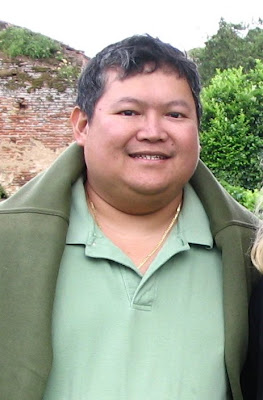
 In 1971 we moved to Makati, Metro Manila. At first we were enrolled in the San Lorenzo School which was owned and operated by Raphael Zulueta de Costa, an old buddy of [my father's] from their days at De La Salle College. Then we transferred to The International School in Bel Air Village. We began our international education from Elementary School to High School. My parents always said we were adopted and that did not bother us much. But one day my parents picked us up from School and our U.S.-American friends could not believe I had white parents. The was my first inkling about racism and it did not come from the Filipino or Spanish community I lived in.
My poetry is touched by the adoption but I’ve never had the hankering to go back to the Philippines to look for my birth family.
_______________
More information and poems about the effect for Nick Carbo as a Filipino adopted by white parents is available at NPR, HERE, as well as Letteratura della migrazione, HERE.
In 1971 we moved to Makati, Metro Manila. At first we were enrolled in the San Lorenzo School which was owned and operated by Raphael Zulueta de Costa, an old buddy of [my father's] from their days at De La Salle College. Then we transferred to The International School in Bel Air Village. We began our international education from Elementary School to High School. My parents always said we were adopted and that did not bother us much. But one day my parents picked us up from School and our U.S.-American friends could not believe I had white parents. The was my first inkling about racism and it did not come from the Filipino or Spanish community I lived in.
My poetry is touched by the adoption but I’ve never had the hankering to go back to the Philippines to look for my birth family.
_______________
More information and poems about the effect for Nick Carbo as a Filipino adopted by white parents is available at NPR, HERE, as well as Letteratura della migrazione, HERE.
THE NUMBER ONE SONG ON THE DAY I WAS BORN
WAS “OH, PRETTY WOMAN” BY ROY ORBISON
The parents that gave me up for adoption
probably didn’t even have a transistor radio—
amplitude modulation waves could have carried
Orbison’s voice around Mayon volcano,
over thatch roofed nipa houses, under
karabao’s legs, through kissing bicolano lovers,
and passed through my newborn body.
I still remember the day Roy died on
December 6, 1988, waking up
to a loss of melody, the mellifluous
manner that all sounds used to come to me.
My college friend John Kintz and I raised
our beer mugs to honor the legend. John,
a proto-punk musician and a former drug
dealer who once showed me the scar
on his penis. We shared this loss
while the bartender tolled a brass bell
as he wailed “Orbison is dead, our music is dead!”
I could understand his hyperbole
to the bone. Loss is something you can’t rent
and it has no time limits—my natural
parents are most likely dead by now,
their effect on the 100 trillion cells on my body
as invisible as a lost radio signal.
My response to John’s penis was silence,
there was no connection there
to hold onto, or mouth a slippery reply.
So we went outside to smoke a joint
and talk about the pretty women
in our lucky, lucky lives.
THE BOY IN BLUE SHORTS
The screaming woman on the other side
of our tall black gate
would have thrown a rock at me.
My maid, Rosita, sheltered me from the insults—
something about my being
retarded and full of worms.
The woman nudged her son forward.
Blue shorts, clean T-shirt, rubber slippers.
She said her little boy was the one
who should have been adopted, he was healthy.
He was about my age,
four or five. We were both silent.
I want to see the Mr. and the Mrs.,
they are making a big mistake.
Rosita bolted the gate, took me by the hand—
they are bad people, don't listen to them.
I felt the crisp whiteness of her skirt all the way across
the garden, back to our house.
AT FIVE, WHILE EXPLORING THE CREEK BEHIND MY HOUSE
A group of children saw me
standing on the other side.
They stopped their game
of patintero.
A boy and a girl walked
across the coconut bridge,
urged me to cross over
and play with them.
The barefoot boy,
and then the girl
negotiated the narrow trunk.
I took two steps
and almost slipped.
The children across the creek
screamed I should remove
my shoes
because the bridge
was slippery.
I jumped back to the bank,
noticed they were all barefoot,
they were still urging me on.
I was afraid of falling
and would not leave
my new leather shoes
behind.
Without waving good bye,
I ran home,
past our barbed-wire fence
the one with the bright-red
bougainvilleas.
***
ABOUT THE POET:
Nick Carbo is the author of four books of poetry: Chinese, Japanese, What are These? (Pecan Grove Press, 2009), Andalusian Dawn (Cherry Grove, 2006), Secret Asian Man (Tia Chucha Press, 2000), and El Grupo McDonald's (Tia Chucha Press, 1995). He has edited important anthologies of Filipino and Filipino American writing: Pinoy Poetics (Meritage Press, 2006), Babaylan (co-edited with Eileen Tabios, Aunt Lute Books, 2000), Returning a Borrowed Tongue (Coffee House Press, 1995).
'
2 comments:
Nick:
I'm glad you are still with us, enjoying new love, and look forward to new poems and new projects from you!
Jean Vengua
Giavanna Munafo just wrote a poem prompted by Nick's "The Number One Song on the Day I was Born was 'Oh, Pretty Woman' by Roy Orbison." You can see it as part of her contribution to PoA:
http://poetsonadoption.blogspot.com/2011/04/giavanna-munafo.html
I love dialogues with poems!
Eileen
Post a Comment